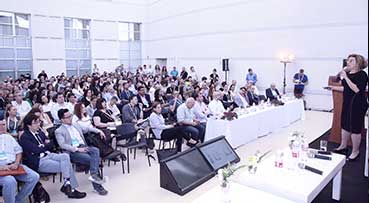Much has been written about the rapid changes in technology and their implications on our world in general and more specifically on the world of work. One of the interesting debates around us questions the implications of these changes on employment. Or more explicitly, is this technological era a danger to the human world of work, will computers and robots replace us at our jobs?
On the one hand, there are those who declare there is no real danger here. To begin with, we’ve been having this conversation for centuries. Workers once feared the introduction of machines onto the production lines. Charlie Chaplin turned this dread into the film “Modern Times”, where the machine swallows the workers. But reality was different and the era of industrial automation did not reduce employment. To the contrary, the industrial revolution has allowed the workers to share the benefits as productivity increased, jobs and professions were created and entire industries were born.
If we follow the same logic, the age of computing will be no different. Our world of work today includes dozens of jobs and professions which did not exist a few years ago: data analysis jobs, App developers, cloud specialists, social media sales and marketing experts. These are but a few examples of professions and jobs created as a result of the technological changes of the last decade.
Yet, while these new area of work were being created, others have disappeared as a result of exactly the same changes. That is why, from the opposite end of the debate on what the new era of technology will do to jobs, there are those who claim the new era will change the nature of work and the availability of jobs in many industries and professions.
According to this argument, up until recently computer dealt with actions defined by a fixed set of rules. In other words, someone defined an “If – Then” sequence, “If this happens, then do that”. We wrote software, the computer executed on it. But now, computers are learning to understand, speak, hear, see, respond and maybe soon even think….
Algorithms, for example, process large amount of information, the most mankind has ever collected, thus enabling us to identify patterns we wouldn’t have known to look for. As a result of such capabilities, computers can now begin to replace jobs in broader areas such as customer service, issue resolution etc.
In addition, progress in the fields of robotics and sensors allows machines to perform a wider range of operations. According to a number of studies, this will change the nature of work in a broader variety of industries which, up until now, were relatively untouched by automation. According to a study published in 2013 by Oxford University, 47 percent of total US employment is at a high risk of being replaced by automation in the next decade or two. Gartner also announced several months ago that one of every three positions is likely to be replaced by the year 2025 with either software, a robot or a smart machine.
Consider this – if cars drive on their own, we will not require drivers. If we can converse with a computers which understand us, is able to process information and respond, we might not need customer service agents. If we can use a three-dimensional printer to print an entire house, we might not need builders. Amazon is already using robots in its warehouses, replacing the jobs that were there before. Hitachi is already experimenting with a GPS-guided robotic tractor in Australia. It will probably increase the productivity of agriculture but what will it do to the jobs on the farms?
How will all this affect your job? And do we prepare our own careers for a world where many existing professions might disappear?
Every organization knows the need to plan ahead, be aware of changes in the environment and the implications of these changes on it’s business model, customers, products. As managers, we know that if fail to stay current with trends affecting our strategy, we are likely to discover at some point that our cheese has moved and we are no longer growing as an organization, maybe even becoming irrelevant. As managers we are clear about the need to look ahead and proactively think and plan for any trends which might affect the organization
There really is no reason why we wouldn’t treat our career the same way! All these changes in the markets, the new technologies & capabilities, they also affect jobs and professions and through them, our career.
Ask yourself, are you planning your career looking backwards or are you planning it boldly considering the future?
There are those who can build on their past education and experience and adapt them to work in newly created jobs, industries and opportunities. Food for thought – the driverless car ecosystem will require designers, infrastructure, systems, many which do not exist today. Whole new services will probably emerge as a result of such a transportation system. The three-dimensional printer which will print our house will need new materials, design capabilities and a whole new infrastructure. Where do these opportunities meet your experience? Your education? Your passion?
You might be thinking this is so “out there” it doesn’t really meet you here and now. I recently observed a 3D printer in the office of small business installing aluminum windows in residential homes. When I asked what they were using this 3D printer for, I was surprised to learn they were designing and printing parts aimed to solve customer issues and, once perfected, they could send them to an aluminum manufacturer for production. Here is an example of a small business that is not likely to be left behind… In contrast, I have also met software professionals with a decade or two of experience, who found themselves back in the labor market only to discover that their ecosystem has changed so much, they were left with very little relevant experience.
Ask yourself, how do the changes around you reflect on your profession, what are they doing to the industry you are in? Stay relevant, stay updated. Read articles, attend conferences, follow thought leaders, join and participate in conversations with likeminded people, build your networks. Evaluate your own experience against existing positions in your area of expertise, would you hire yourself?
The trends around us can potentially affect our careers just as much as they touch the businesses. This isn’t to say our past education and experience don’t count. They do. But we do have the responsibility to prepare our careers for changes to come. Recognize the changes that touch your career, keep your knowledge and capabilities up to date and manage your brand in the labor market. And don’t be afraid of change!

![large-AX1A2125-2[1]](https://niritcohen.com/wp-content/uploads/elementor/thumbs/large-AX1A2125-21-pnzedcs72atx5aeurqytqdiihxixlq02re9mlz805s.jpg)






